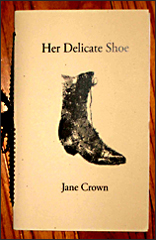
Jane Crown’s Her Delicate Shoe is a compelling poetical read. Eschewing the verbal pyrotechnics that has bedeviled so much of contemporary American poetry, Crown chooses a plain style to tell us about herself, her loves, and losses. Hers is a poetry rooted in reality, not speculation or fancy footwork. And since it is a poetry that revels in the seemingly quotidian, Crown’s is a poetry that while celebrating the small, loving joys of everyday life, also recognizes that everything comes to an end, nothing is permanent, the nature of life is loss.
Nowhere is that recognition of loss and the inevitability of ultimate destruction more eloquently described than in “The Fatalists,” a short poem, ostensibly about the Jains or Jainists, that Sub-continental sect that “make{s} sure not an iota of/life be slain.” In wonderfully plain style diction Crown tells us:
“They continue to shrink in numbers ever since inception,
Respecting life
as they have.”
Even the best are doomed, it seems.
And even beyond ironies there are joys along the way, as in "My Bicycle Lover," in which Crown, at the thought of her lover, who is possibly just a kid, "I smile wide like sweet, cold coffee/you sing in the sun, you peddle in the breeze."
This sense of loss and decay is seen also on a personal level, in the final poem in the chapbook, “Aging,” in which Crown, or her persona, laments, “My aging body possesses/Varicose veins of an uncharming blue,” an accurate description of the way that most celestial of colors has a way of turning ugly when it comes to varicose veins. The poem goes on to catalogue the way the physical, outer body breaks down with age. Still, there is wit, even humor even in Crown’s bleak assessment of “I possess pitiful musculature and thinning/Bones…” For the same speaker can also comment, “My ass has become but blasphemy of chocolates/And beer.” The biblical/Shakespearean language allows us to see that the speaker sees her fate in an ironic way.
And even beyond ironies there are joys along the way, as in “My Bicycle Lover,” in which Crown, at the thought of her lover, who is possibly just a kid, “I smile wide like sweet, cold coffee/you sing in the sun, you peddle in the breeze.” There is such affection, such sunny enjoyment of youth in this poem. But that’s the way life is: we’re young and in love one moment, and before we even blink, we’re old and alone. And Crown is honest enough to recognize that sad fact of life.
This sense of joy being swallowed by grief, by life, is most eloquently depicted in “Timbering Jimmy,” which recalls the poet as a young girl with her best friend and playmate, Jimmy:
“I was six, maybe seven, then, you had lively crayons
And a basement full of moldy treasures
“You had a charming West Virginia mother
Who cooked us ham with catsup, and sometimes squirrel.”
“Timbering Jimmy” perfectly captures the wild, carefree days of childhood with their Dylan Thomas-esque “Fern Hill sense of rural magic: “And I was certain you’d learned/How to charm the Ohio river into submission too.” “Charm” is what this poem is all about, and how time and terrible events have a way of wiping out the charm of life, for
“When I was 29, my mother said in passing,/you had died in a car crash.” Notice the subtle pun on death, in “said in passing.” But the poem concludes on this note of acceptance, resignation: “Down to the Midwestern ground of memory/and recalled how/Once I had shyly loved you.” I love this closure.
I’ve barely scraped the surface of the pleasures this chapbook provides. Read it for yourself and be swept away.

